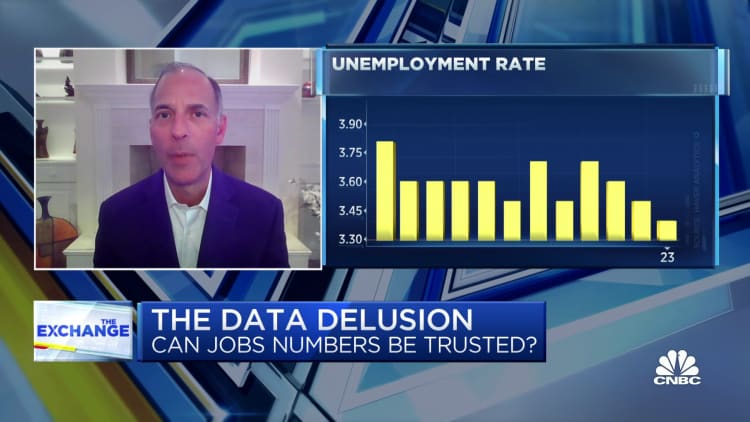HR pre-screening. Talk to the hiring manager. This was followed by six half-hour interviews over three days.
And that’s not all – practice written case studies before another interview with the hiring manager.
Last: Final round with the CEO.
Ayomi Samaraweera, 32, said she ended up not getting the job, which required a total of nine interviews.
She told CNBC Make It: “I enjoyed all the conversations I had with the team, but it was a laborious process and there wasn’t any clarity on the upfront compensation for the role.”
“Or it was clear from my first HR call what the process was going to look like—for example, they didn’t mention that there would be case studies.”
Samaraweera’s setbacks in her job search were not an isolated incident.
Experts interviewed by CNBC Make It say they have observed a “significant increase” in the number of job seekers facing extended interview processes over the past year.
“This seems to be a growing trend across industries, with candidates going through more rounds of interviews and rigorous testing than ever before,” says career coach and resume expert Steven Leitch.
The time it takes to hire a new employee will hit a “record high” in 2023, according to a June report from Josh Bersin Company and workforce solutions firm AMS.
Make no mistake, the recruiting market isn’t going to get easier anytime soon.
jim sykes
Global General Manager, Customer Operations, AMS
The report shows, Average Time To Hire Q1 2023 All industries gained an extra day – bringing the hiring process to an average of 44 days.
“As our data shows, time to hire has continued to grow over the past four years. There is no doubt that the hiring market is not going to get easier anytime soon,” said Jim Sykes, global managing director of client operations at AMS, in a statement.
Why interviews are getting longer
While there is “no formula” for the acceptable number of interviews, people interviewed by CNBC said three to five rounds of interviews are reasonable for nonmanagement positions.
“This allows companies to evaluate candidates from different perspectives, while respecting candidates’ time and maintaining an efficient hiring process,” Leitch said.
But the growing phenomenon of lengthy interviews reflects He added that the current job market is very competitive.
“As remote work takes off and companies have access to more talent, they’re becoming more cautious and looking for more ways to thoroughly evaluate candidates.”

Resume and workplace expert Richard Lambert said economic uncertainty has also created an air of anxiety for companies, especially when it comes to hiring.
“Hiring, onboarding and training is an expensive process, and companies want to make sure they’re getting the right candidates from the start.”
He added that companies may adopt longer interview processes to “ideally remove bias” and create a fairer hiring environment.
“By asking more of the candidate through the interview … more data can be collected, allowing for a more comprehensive assessment of the candidate,” he added.
“While it seems like a job in itself that has to go through all of that, it’s fairer.”
Hiring process is a “persuasive” lead
Amy Zimmerman, chief people officer at Relay Payments, said that sometimes the answer to lengthy interviews can be as simple as the company “not knowing what it wants.”
“Or they haven’t been approved to hire, so they’re moving slowly — so they’re adding too many people in the process as a way to figure out the gaps they’re actually trying to fill,” she added.
“That’s why recruiters randomly add steps to the interview process and it’s a poor candidate experience.”
Samaraweera, who had a similar experience, said she hadn’t heard back from the company she interviewed for “more than 4 weeks” despite multiple follow-up emails.
A transparent interview experience with potential future employers will be an important first step in building interest and loyalty.
Amy Zimmerman
Relay Payment Chief Human Resources Officer
“When they finally responded, they said that due to internal changes, the scope of the position was changing, so they are currently putting hiring on hold for the position,” she added.
The company’s “changing goalposts” were a red flag for Samaraweera, who said it showed a lack of alignment within the company, which could lead to problems with the work itself.
“After 4 months they did hire someone for the position and then 3 months later the position was let go. I think it was a blessing in disguise that I didn’t quit my job because of the position.”
Project manager Monica Revuelta, who recently went through five rounds of interviews in four months, says lengthy interviews can become a problem when companies aren’t sensitive or transparent about their processes.
“The way a company presents itself during the interview process can say a lot about the company’s overall culture,” she adds.

“It might get the candidate to think about how this reflects the company’s priorities…communication, and its value to people. Remember, you’re interviewing the company as much as they’re interviewing you,” Rehuerta said.
Companies should be aware that painful and lengthy hiring processes can also backfire on them.
“A lengthy hiring process can lead to candidates becoming frustrated, disengaged, or even dropped out of the process,” Leitch said.
“This could lead to a loss of top talent who may be offered offers from other companies while they wait for a decision.”
Ultimately, Zimmerman says, job seekers have managed the job search like a “side hustle,” which is a stressful process in itself.
“A transparent interview experience for potential future employers will be an important first step in building interest and loyalty.”
do not miss it: Most workers say their well-being has worsened or stayed the same, but their bosses disagree: new survey
Like this story? Subscribe to CNBC to succeed on YouTube!


